INAUGURAL MESSAGE OF THE GENERAL MODERATOR
Celebration of the Thirtieth Anniversary of the Foundation of the Camillianum, the International Institute for the Theology of Pastoral Care in Health
I extend my most respectful greetings to His Excellency Msgr. Enrico Dal Covolo SDB, the Rector of the Pontifical Lateran University.
I also express cordial gratitude to the academic authorities of this Camillian institution of ours: Prof. Palma Sgreccia, the Dean of the Institute; Dr. José Michl Favi, the Vice-Dean of the Institute; and Father Felice de Miranda, the new financial administrator of the Institute.
I would like to give greetings full of respect and dense with gratitude to all the Camillian pioneers who created the Camillianum and have contributed to its development over the years, offering their human, religious and professional expertise as lecturers and accepting posts involving management and coordination (dean, vice-dean and secretary) and academic and administrative responsibilities: the Superior Generals Fr. Angelo Brusco and Fr. Frank A. Monks; the Camillian religious Fr. Luciano Sandrin, Fr. Eugenio Sapori, Fr. Arnaldo Pangrazzi, Fr. Giuseppe Cinà, Br. Jose Carlos Bermejo, fr. Leonhard Gregotsch, fr. Germano Policante, fr. Mario Bizzotto, fr. Rosario Messina, fr. Antonio Puca and the very many other religious and lay people who now live in the beatific light of God the Father, enjoying the prize that is given to ‘His good and faithful servants’…
We are happy that many of these religious and lay people whom I have mentioned are here today to celebrate with us this praiseworthy achievement!
I thank all of you who are present at this special celebration of the thirtieth anniversary of the creation of our Camillianum, the International Institute for the Theology of Pastoral Care in Health, and who are taking part in the conference on the subject ‘Pain and Suffering: Interpretations, Meaning and Care’ (30-31 October 2017) organised for the inauguration of the thirtieth academic year of the Institute.
My prolusion during this inaugural session wishes to dwell upon three specific points: 1. the Camillianum as a ‘famous charismatic value’ in our Order; 2. listening to some pioneering figures who were active from the outset in the life of our Institute; and 3. the Camillianum projected today towards the future: some challenges that have to be addressed.
- As regards ongoing formation (for the whole of a person’s life) and the ad-intra life of the Order:
1.1. In our General Statutes we read: ‘Our religious acquire a clear identity and suitable Camillian training by also availing themselves of the Camillianum and centres for pastoral care, for humanisation and for formation. Each province, vice-province and delegation promotes taking part in these centres and in fundamental courses and/or the obtaining or academic qualifications. Where possible the civil recognition of such qualifications shall be obtained’ (GS, 62).
1.2. In the Camillian Project ‘Towards a Faithful and Creative Life: Challenges and Opportunities (2014-2020)’, we find the statement: ‘Emphasis is laid on the validity of engaging in studies in theology for the youngest religious after the baccalaureate in theology. However, specialisation studies should belong to a real Provincial or inter-Provincial programme of the Order (privileging the Camillianum or other centres for pastoral care in health or humanisation) and only after a minimum of three years of experience of community life lived in ministerial activity. All forms possible should be encouraged to offer publicity to the Camillianum, above all in countries with the greatest availability of students. This should be a commitment of all the religious and in particular of the direct heads of this Institute. Coordination should be fostered of the Camillian centres for pastoral care in health and humanisation, at a macro-regional level, in synergy with the Camillianum as well’.
1.3. A forum for the directors of centres for pastoral care/the Camillianum and Camillian medical doctors. This took place in Madrid in Spain on 21-23 April 2016. Amongst the objectives of this meeting was that of ‘involving our centres for pastoral care, the Camillianum and universities in responding to the current challenges of the world of health and health care, in particular in situations of emergency or ones involving disasters, constructing and/or strengthening the resilience of the population and the most vulnerable communities’.
I would like to remember the thoughts of two Camillian religious who were some of the architects of the beginnings of the process leading to the life of the Camillianum, and the voice of Pope St. John Paul II.
2.1. Fr. Calisto Vendrame, the former Superior General of the Order, in his inauguration speech for the Institute observed (7 November 1987): ‘It only remains to me to wish this ship a good voyage as it sets off under the safe leadership of Father Dr. Domenico Casera to still unknown seas and gulfs, perhaps sown with mines and inhabited by pasdarans. Truly, this is not an easy undertaking’.
2.2. Fr. Francisco Alvarez, whom we must thank for being the first secretary of the Institute, in 1993 argued that ‘deepening theological and pastoral formation (a grave defect in health-care consecrated life) and overcoming the temptation of the immediate, navigating by the ‘short waves of charity’ or by the narrow way of a professionalism without a mission, is something we cannot avoid and something that is urgent’. In 1987 he observed that ‘theological-pastoral language and criteria in the world of health, of suffering and of death are calling out for renewal’.
2.3. Pope St. John Paul II, in the audience granted to the Camillian religious of their General Chapter of 1995, said: ‘I exhort you to always conjoin irreplaceable nearness to the sick with an evangelisation of the culture of health care, in order to bear witness to the gospel vision of living, of suffering and of dying. This is the fundamental task that you have performed in the institutes for formation of your religious family and especially in the International Institute for the Theology of Pastoral Care in Health, the Camillianum, of Rome’.
In the year 2000, on the occasion of the four hundred and fiftieth anniversary of the birth of St. Camillus, St. John Paul II exhorted us to cultivate ‘a special attention that must also be paid to the promotion of a culture that respects the rights and the dignity of the human person through academic institutes, especially the Camillianum, and the centres for pastoral care and the health-care institutions to be found in the various nations of the world’.
- The Camillianum today directed towards the future: some challenges that must be addressed with the intelligence of the heart and the wisdom of God
The Camillianum has formed a part of the Faculty of Sacred Theology of the Pontifical Lateran University since 23 June 2012 and this incorporation was recently renewed for another five years (2017-2022). With academic realism, the Camillianum has also committed itself to respecting the requirements of an academic and administrative character as established by the so-called Process of Bologna, a process for the international reform of the systems of higher education of the European Union. The Camillianum is the only academic institute for the theology of pastoral care in health in the Catholic Church and for thirty years it has trained lecturers in theology (with a specialisation in pastoral care in health); experts in the field of social care; and diocesan key figures for the animation of pastoral care in health and spiritual assistants (chaplains).
I will briefly cite the statistics of a number of successes of these thirty years of activity of the Institute: students: 988 (1987–2017), of whom 135 have been ‘Camillian’ students; doctoral theses: a total of 47, of which 13 have been defended by ‘Camillian’ students; licences awarded: 301, of which 93 to ‘Camillian’ students; total number of diplomas awarded: 192, of which 3 to ‘Camillian’ students (data provided by the secretariat of the Camillianum on 24 June 2017 for the visit of the major Superiors of the Order to the Institute).
During the course of these thirty years, care and industry have been dedicated to the production of academic and scholarly research of a high quality, above all in relation to the Institute’s special fields, those of pastoral care in health, Camillian spirituality and the Camillian charism, ethics and bioethics, and the theology of health…to name just some areas of research that have been explored. We are talking here of hundreds of texts and volumes. I may also draw attention to the quarterly review Camillianum and an interdisciplinary work that had a great impact: the Dizionario di Teologia Pastorale Sanitaria (‘A Dictionary of the Theology of Pastoral Care in Health’; January 1997), which was subsequently translated into Portuguese and Spanish. A regards this work, the Council of the Institute has decided to publish a new and updated edition. It is hoped that this will be ready by July 2019 (the feast day of St. Camillus).
We are going through a critical moment because of a shortage of students from some parts of the global geography of the Camillians. There is an extremely urgent need for a renewal of the ‘academic body’, with the gradual incorporation of new Camillian lecturers with suitable academic qualifications. As the current General Moderator of this Institute, I have said and repeated on innumerable occasions inside our Order and also at various meetings of the academic council of the Institute that the Camillianum, now that it has become an ‘adult’, must be ‘re-invented’. Over the last thirty years times have changed radically. More than in an epoch of profound and rapid changes, we are living at a time of epochal change. In line with this spirit, exactly at this historical moment of celebration and commemoration of the thirty years of life of the Camillianum in the panorama of pastoral care in health, this academic institute is today the subject of an intense analysis on the part of the general government of the Order.
We believe and we are convinced that in order to attempt a relaunching of the Institute, or at least to assure its survival, and the continuation of its activities, it is indispensable that its structure be reviewed from an academic, administrative, organisational and economic point of view. Changes in the organisational structures and those involving people are absolutely necessary.
At the present time we have identified three urgent priorities:
- Achieving a recognition of the juridical status of the Camillianum with the Italian State, detaching this institute from the Camillian Province of Rome. We strongly thank, with profound gratitude, the Camillian Province of Rome for having welcomed and supported the Camillianum over the last thirty years.
- A revision of the statutes of the Camillianum, on which we have been working by consulting specialists in the management of universities: it is a request from the same Pontifical Lateran University for an ever more precise adaptation to some academic aspects (see Bologna Process). The Camillianum, Academic Institute, is a clear feature of the Camillian Order which at this time in history is aware of the urgent need to redefine its accounting and administrative organization by providing it with some university professions in these functional areas so that it can respond to effective way to meet current challenges. The Moderator General is living with this involvement and mission with particular involvement, as interpreted by them as an expectation of the whole Order.
- The question of the economic-financial sustainability of the Institute. The time has already come to an end when it was enough to repeat: ‘this is the task of the General Curia alone’. We must all seek together a new creative formula to achieve the necessary economic-financial sustainability that will assure the continuity of academic activities. This task does not belong solely or exclusively to the General Curia of the Order – it is also the special responsibility of the immediate heads of the Institute itself. This is a challenge that requires conversion to a new culture with an approach of professionalised humanism (in harmony with the values of our Camillian charism and our ethical, administrative and juridical values) which goes beyond that ‘family culture and dynamic’ that has worked quite well so far, but which cannot function any longer in the mature and responsible style of the most modern forms of university management. Therefore, both in the academic field and in the administrative sector we must be united, according to the same institutional and charismatic objectives (aware of rights – certainly! – but without forgetting duties), in an approach of working together ‘with and for the other’ and not ‘against the other’; with real ‘team work’, like a real symphonic orchestra!
I will end with a fraternal recommendation. For about twenty years of my life I was involved in this academic-administrative area at the university of Brazil and from this baggage of experience I can say that to a certain extent I know the lights and shadows of this field. As such, I believe that I can state that if our knowledge is not transformed into wisdom to help other people, those in need and the suffering of our vulnerable society, it remains useless knowledge, and its only purpose is to nourish our egos and as a consequence we run the risk of adopting attitudes marked by arrogance, self-sufficiency, a cliquish approach, and fundamentalism. Here personal interests run the risk of being above institutional and charismatic values. This is a grave malady, a real cancer that we have to extirpate immediately, as soon as it is diagnosed. I will never tire of remembering and praying: ‘From the PhD gods: deliver us O Lord’.
The denial of the other easily leads to losing sight of the context of life to which we belong and of the institutional charismatic spirit by which we live, that is to say the incommensurate value and dignity of people and the purely instrumental value of things. We become indifferent and insensitive to the true newness of the Spirit of God. Simplicity and humility are, and always will be, a sign of true divine wisdom that offers true zest to human scientific knowledge. The true experts in humanity that we know are very humble!
We cannot betray the spirit of the original insight of our founder St. Camillus de Lellis (1550-1614) who created a ‘nova schola caritatis’ (‘new school of charity’) which invites us in all our choices to put ‘our heart in our hands’!
I hope and wish that the skilled creativity of love and intelligence of the heart can be always placed by all of us at the service of the noble cause of pastoral care in health, the GPS by which to direct the true pathway for the construction of a future of hope for our Camillianum.
Rome, 30 October 2017
Fr. Leocir Pessini
Superior General of the Camillians
General Moderator of the Camillianum


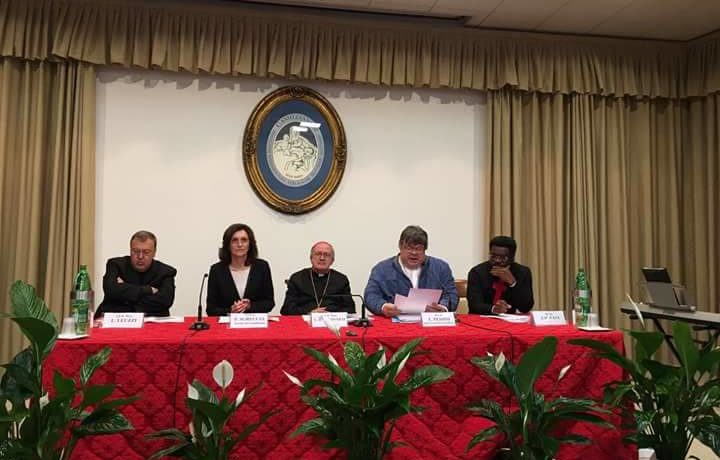

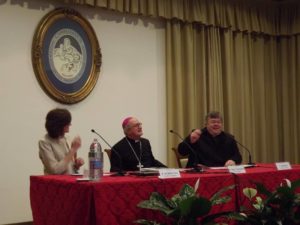
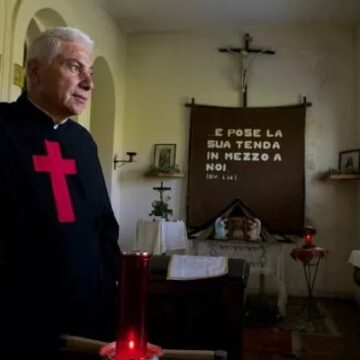

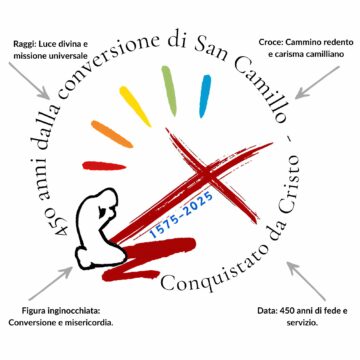


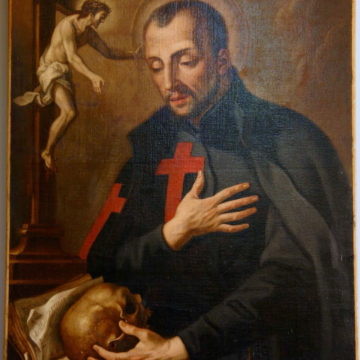


Camillians on Facebook
Camillians on Twitter
Camillians on Instagram